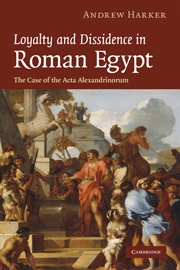Book contents
- Frontmatter
- Contents
- Note on abbreviations
- Chapter 1 Introduction
- Chapter 2 The embassies to Gaius and Claudius
- Chapter 3 The Acta Alexandrinorum: Augustus to the Severans
- Chapter 4 The Acta Alexandrinorum: The historical background
- Chapter 5 Between loyalty and dissent: The Acta Alexandrinorum and contemporary literature
- Chapter 6 Conclusion
- Appendix I Editions of the Acta Alexandrinorum and related texts
- Appendix II The status of the Alexandrian Jews
- Appendix III The ‘dubious or unidentified’ fragments
- Bibliography
- Index
Chapter 4 - The Acta Alexandrinorum: The historical background
Published online by Cambridge University Press: 22 September 2009
- Frontmatter
- Contents
- Note on abbreviations
- Chapter 1 Introduction
- Chapter 2 The embassies to Gaius and Claudius
- Chapter 3 The Acta Alexandrinorum: Augustus to the Severans
- Chapter 4 The Acta Alexandrinorum: The historical background
- Chapter 5 Between loyalty and dissent: The Acta Alexandrinorum and contemporary literature
- Chapter 6 Conclusion
- Appendix I Editions of the Acta Alexandrinorum and related texts
- Appendix II The status of the Alexandrian Jews
- Appendix III The ‘dubious or unidentified’ fragments
- Bibliography
- Index
Summary
In this chapter I will examine the historical background to the Acta Alexandrinorum literature. I will initially explore the origins of the literature by looking at the possibility that documents, such as trial minutes, were among the sources used by its writers, who I will suggest may have been Alexandrian Greek ambassadors. I will then focus on the extent to which the Acta Alexandrinorum should be considered dissident literature by looking at the readership of the stories and comparing them with known literary expressions of dissent from Roman Egypt, such as mimes and oracles. I will propose that the Acta Alexandrinorum may not have been a unique Alexandrian phenomenon by looking at similar literary production from other Greek centres which had close links to Alexandria. I will end by challenging the view that events in Alexandria under the Severans led to a surge in popularity of the stories and their subsequent decline.
THE SOURCES OF THE ACTA ALEXANDRINORUM LITERATURE
Justin and Tertullian, two second-century ad Christian writers, refer to a document called the Acta Pilati, a copy of the minutes taken at the trial of Jesus, which Pilate allegedly subsequently sent to Tiberius in Rome. The historicity of this story and the existence of such a document is questionable. Nonetheless, these writers assumed that minutes of the trial (acta) would have been recorded and that a copy of the document would have been stored among the emperor's papers (the imperial commentarii) in Rome, where it could be accessed.
- Type
- Chapter
- Information
- Loyalty and Dissidence in Roman EgyptThe Case of the Acta Alexandrinorum, pp. 99 - 140Publisher: Cambridge University PressPrint publication year: 2008

